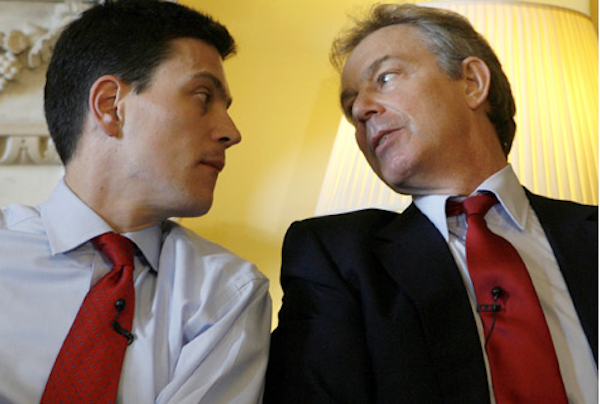Frustrated with David Cameron? The perfect remedy lies in your newsagents today. Tony Blair has a a piece in the Mail on Sunday and his aspirant jedi padawan, David Miliband, has one in the Sunday Telegraph. Both serve a refreshing reminder of the stale, elitist, failed thinking that David Cameron swept aside with his historic referendum pledge last week.
Having taken a break from frontline politics, both Blair and Miliband might have returned with fresh ideas for connecting Labour to the voters it alienated. Instead, both seem to have spent their time hanging out with business jet-set and, increasingly, speak as their envoys. Blair opens his piece by telling us how his friends – ‘outside of Britain,’ natch – are deeply concerned about the idea of the public being given a say in the future of their country.
“There is only one question on their lips: ‘Are you guys seriously going to leave Europe?’ The incredulity with which they ask reflects their view of the wisdom of leaving… Up to last Wednesday I would answer confidently (though not always feeling it): no, we’re staying in Europe. After David Cameron’s speech, in which, for the first time since we joined Europe almost 40 years ago, a leader of a party with a chance of governing has said it will be its policy to put leaving to a referendum, I can’t give that answer. The answer has to be: maybe.
God knows why businessman asks Blair about Britain – he’s hardly been here for the last four years. Ask him about Emirates business class, yes, or how much Kazakstan businessmen pay those who help prop up their regimes. But not Britain.
Those with a taste in schadenfreude should read all of Blair’s piece. The world is changing, he reveals, China will soon be a big world power. This is precisely the case for reforming our trading system: right now, Switzerland sells more to China that Britain does – not bad for a country a quarter of our economic size. The idea that you need to be in the Eurozone to profit from globalization is risible: the unfair and often immoral tariffs that the EU imposes to try and protect its member states from globalization are, if anything, holding us back.
Britain’s share of trade with the new emerging economies is one of the smallest in Europe – and before, in the Commonwealth, we had a rather good global free trade thing going on. Blair’s attempt to conflate EU membership with trading block membership is a joke. But Blair’s piece finishes in the best joke of all. “I believe there is a sensible, solid majority in the UK for us to stay in Europe.” On page 8-9 of the same newspaper, the latest poll shows 50 per cent want out of the EU, and 36 per cent want in. I suspect Blair would, if challenged, stress the word “sensible”.
You’d think Miliband would know better, but he also seems to regard Cameron’s Euro pledge as a form of political self-immolation. Cameron has “pulled the rug from under him” – by which Miliband means that Cameron won’t be as welcome in these Brussels soirées anymore. Have’t Tories learned the first rule of Labour statesmanship: that the British public are there to be invoked in speeches, not actually consulted?
Britain has moved on from this de-haut-en-bas way of governing. The expenses scandal accelerated a collapse of confidence in MPs and ministers – and Cameron has understood this better than anyone. He is trying a new form of government: one which seeks to pass power from the few to the many. Not saying “trust me” but “I trust you”. As I argued in my last Daily Telegraph column, this includes a power flip in schools and hospitals – letting parents and patients choose.
Crucially, the economy has moved on too. Big businesses are, on the whole, shedding jobs – most job creation comes from small businesses. Our future depends on the emergence of companies that have not been invented yet, so the bodements of big business should not be taken so seriously.
Once, Blair and Miliband both understood the direction that Britain was taking, and both were adapting to it quite well. Miliband used to speak of “double devolution” – moving power no just from central to local government, but from local government to the people. Blair used to call it the “choice” agenda, supposedly his defining mission.
Neither seem to like the idea of choice now – especially when it comes to letting people choose what happens to their country. It’s sad to see, but both now exemplify a very recognisable type of left-winger: one who will do anything for the working class, except trust them.
PS: It’s odd to think it but the Conservatives, now, trust the working class more than any other party. If Cameron is smart, he’ll point this out.







Comments